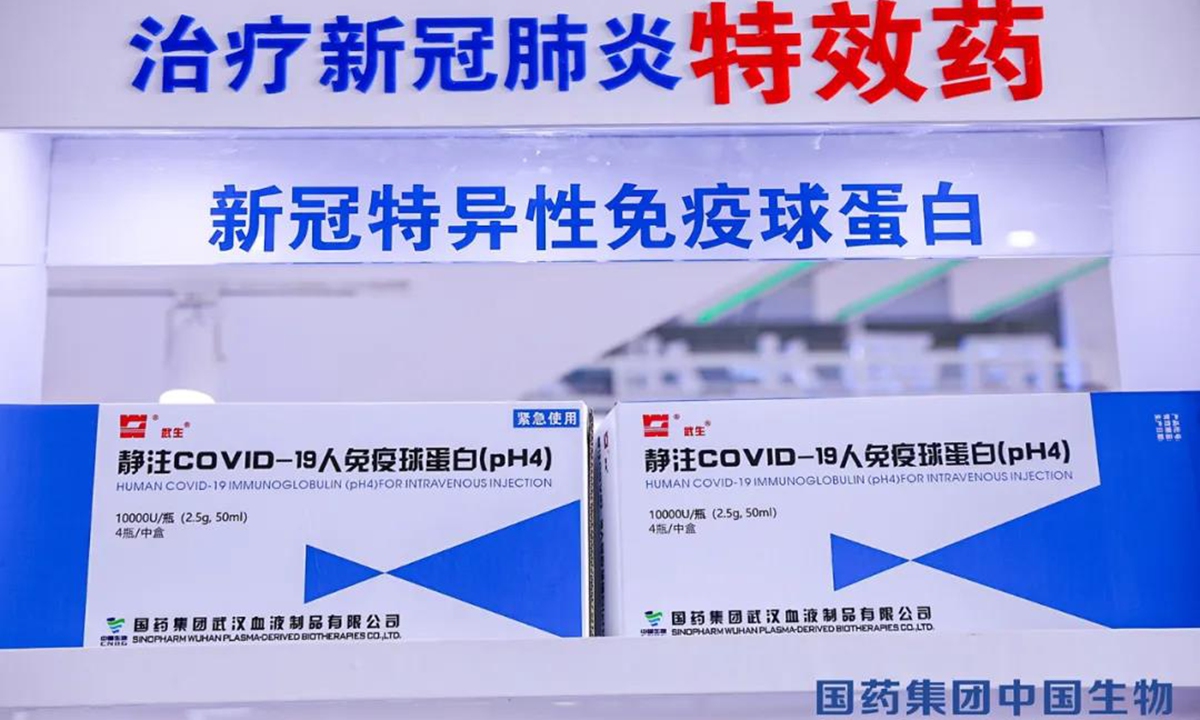
Photo: CNBG
Chinese researchers and drug manufacturers are among the frontrunners in COVID-19 drug research and development (R&D), and they are closely working with international partners, experts said, after Sinopharm revealed the world's first COVID-specific drug based on vaccinated people's plasma at the 2021 China International Fair for Trade in Services.
China also has an advantage in applying traditional Chinese medicine (TCM) to treat COVID-19, experts noted.
Overall, it is more difficult to develop effective drugs than it is for vaccines, as doing so in a way that's safe for patients requires deeper understanding of the virus, Shanghai-based expert Tao Lina told the Global Times on Monday.
A Jiangsu-based biological company called Xingji developed a broad spectrum neutralizing antibody product against SARS-COV-2 infection that is suitable for emergency use among high-risk groups who were exposed to the novel coronavirus.
It can also be used for the treatment of asymptomatic, mild and ordinary novel coronavirus-infected people, and to prevent infected people from developing severe symptoms, the Global Times learned from one of Xingji's investors, Fosun Health Capital.
The product is still undergoing the clinical trials, but the current lab study showed that the antibodies can well neutralize all revealed novel coronavirus mutants, including Delta and Lambda strains.
It can be further developed into an inhalation dosage form to stimulate an immune response in a person's respiratory tract.
Brii Biosciences, a company that has dual headquarters in China and the US, announced on August 25 that its SARS-CoV-2 neutralizing monoclonal antibody combination therapy BRII-196/BRII-198 demonstrated a statistically significant reduction of 78 percent in the combined endpoint of hospitalization and death in phase III clinical trials conducted in the US, Brazil, South Africa, Mexico, Argentina and the Philippines.
The therapy has already been used in China in response to recent coronavirus resurgences caused by the Delta variant in Guangzhou, Shenzhen, Ruili, Kunming, Nanjing, Yangzhou, Zhangjiajie and Zhengzhou, according to the company website.
Chinese manufacturers are among the frontrunners of their international partners in exploring monoclonal antibodies to treat COVID-19.
The US Food and Drug Administration on August 10 authorized REGEN-COV of Regeneron Pharmaceuticals for emergency use as post-exposure prevention for COVID-19, following its authorization in May of the investigational monoclonal antibody therapy sotrovimab co-developed by Glaxo Smith Kline and Vir Biotechnology for the treatment of mild-to-moderate COVID-19.
Drugs based on antibodies are one of the main approaches to developing COVID-19 drugs. But these drugs are likely to be expensive, and as their mode of action is to neutralize the virus in patients' blood, they're more suitable for critical and severe patients, a Beijing-based immunologist told the Global Times on Monday on condition of anonymity.
For early-stage treatment and prevention, small-molecule compound drugs would be a more advantageous approach, the expert said, noting that a lot of research institutes and labs in China have launched related work on this approach, including the one where he works, and found some safe candidates.
The main problem is to fund the clinical research, the expert said.
The World Health Organization (WHO) has been cooperating with global drug manufacturers to screen some existing compound drugs for COVID-19.
In July, the WHO recommended interleukin-6 receptor blockers for people with severe COVID-19. These are the first drugs found to be effective against COVID-19 since corticosteroids were recommended by the WHO in September 2020.
In August, the WHO also delivered three new drugs into clinical trials for COVID-19 treatment, which involve thousands of researchers at more than 600 hospitals in 52 countries and regions.
The three new drugs are artesunate, a treatment for severe malaria; imatinib, a drug for certain cancers, and infliximab, a treatment for immune system disorders such as Crohn's Disease.
These therapies were selected by an independent expert panel for their potential in reducing the risk of death in hospitalized COVID-19 patients, and they were donated for the trial by their manufacturers, WHO said.
In its previous efforts, WHO has tested four drugs, namely remdesivir, hydroxychloroquine, lopinavir and interferon, and the initial results showed that they had little or no effect on hospitalized patients with COVID-19.
Specific to China, there is a third approach deserving further research, which is TCM. These medicines played a vital role in China's fight against the virus in 2020, the abovementioned immunologist said.
He noted that TCM ingredients such as Ma Huang, or Chinese ephedra, widely used in therapies to treat lung disease, are worth more research and could play a vital role in treating COVID-19.